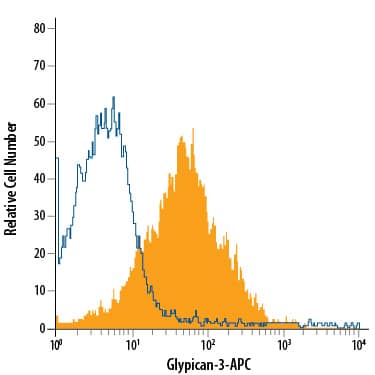Human Glypican 3 APC-conjugated Antibody Summary
Gln25-Val558
Accession # P51654.1
Applications
Please Note: Optimal dilutions should be determined by each laboratory for each application. General Protocols are available in the Technical Information section on our website.
Scientific Data
 View Larger
View Larger
Detection of Glypican 3 in HepG2 Human Cell Line by Flow Cytometry. HepG2 human hepatocellular carcinoma cell line was stained with Mouse Anti-Human Glypican 3 APC-conjugated Monoclonal Antibody (Catalog # FAB2119A, filled histogram) or isotype control antibody (Catalog # IC003A, open histogram). View our protocol for Staining Membrane-associated Proteins.
Reconstitution Calculator
Preparation and Storage
- 12 months from date of receipt, 2 to 8 °C as supplied.
Background: Glypican 3
Glypicans (GPC) are a family of heparan sulfate proteoglycans that are attached to the cell surface by a glycosylphosphatidylinositol (GPI) anchor. Six members of this family have been identified in mammals (GPC1-GPC6). All glypican core proteins contain an N-terminal signal peptide, a large globular cysteine-rich domain (CRD) with 14 invariant cysteine residues, a stalk-like region containing the heparan sulfate attachment sites, and a C-terminal GPI attachment site. While glypican proteins do not share strong amino acid sequence identity (they range from 17-63%), the conserved cysteine residues in their CRDs suggests similarity in their three‑dimensional structure (1, 2).
Mutations in GPC3 cause a rare disorder in humans, Simpson-Golabi-Behmel Syndrome, which is characterized by pre and postnatal overgrowth of multiple tissues and organs and an increased risk for developing embryonic tumors (3). These features are also present in the mouse knock-out of GPC3 indicating that GPC3 regulates cell survival and inhibits cell proliferation during development (4). Glypican 3 has been implicated in regulating many different signaling pathways including: IGF, FGF, BMP, and Wnt. An endoproteolytic processing of GPC3 by proprotein convertases is required for the modulation of Wnt signaling (5). Direct interaction with FGF-basic has been observed and is mediated by the heparan sulfate chains (6).
- Filmus, J. and S.B. Selleck (2001) J. Clinical Invest. 108:497.
- De Cat, B and G. David (2001) Seminars in Cell & Dev. Biol. 12:117.
- Pilia, G. et al. (1996) Nat. Genet. 12: 241.
- Cano-Gauci, D.F. et al. (1999) J. Cell Biol. 146: 255.
- De Cat, B. et al. (2003) J. Cell Biol. 163:625.
- Song, H.H. et al. (1997) J. Biol. Chem. 272:7574.
Product Datasheets
Citations for Human Glypican 3 APC-conjugated Antibody
R&D Systems personnel manually curate a database that contains references using R&D Systems products. The data collected includes not only links to publications in PubMed, but also provides information about sample types, species, and experimental conditions.
6
Citations: Showing 1 - 6
Filter your results:
Filter by:
-
Disruption of TGF-? signaling pathway is required to mediate effective killing of hepatocellular carcinoma by human iPSC-derived NK cells
Authors: Thangaraj, JL;Coffey, M;Lopez, E;Kaufman, DS;
Cell stem cell
Species: Human
Sample Types: Whole Cells
Applications: Flow Cytometry -
Recombinant immunotoxin targeting GPC3 is cytotoxic to H466 small cell lung cancer cells
Authors: Ewelina Rodakowska, Aurelia Walczak‑Drzewiecka, Marta Borowiec, Michal Gorzkiewicz, Joanna Grzesik, Marcin Ratajewski et al.
Oncology Letters
-
Comparison of Human Antral Follicles of Xenograft versus Ovarian Origin Reveals Disparate Molecular Signatures
Authors: L Man, N Lustgarten, E Kallinos, Z Redhead-La, S Liu, B Schattman, D Redmond, K Hancock, N Zaninovic, G Schattman, Z Rosenwaks, D James
Cell Rep, 2020-08-11;32(6):108027.
Species: Human
Sample Types: Whole Cells, Whole Tissue
Applications: Flow Cytometry, ICC, IHC -
Clinical significance of glypican-3-positive circulating tumor cells of hepatocellular carcinoma patients: A prospective study
Authors: M Hamaoka, T Kobayashi, Y Tanaka, H Mashima, H Ohdan
PLoS ONE, 2019-05-29;14(5):e0217586.
Species: Human
Sample Types: Whole Cells
Applications: MACS -
High-density single cell mRNA sequencing to characterize circulating tumor cells in hepatocellular carcinoma
Authors: D D'Avola, C Villacorta, SN Martins-Fi, A Craig, I Labgaa, J von Felden, A Kimaada, A Bonaccorso, P Tabrizian, BM Hartmann, R Sebra, M Schwartz, A Villanueva
Sci Rep, 2018-08-01;8(1):11570.
Species: Human
Sample Types: Whole Cells
Applications: Flow Cytometry -
New tumor suppressor microRNAs target glypican-3 in human liver cancer
Authors: F Cartier, E Indersie, S Lesjean, J Charpentie, KB Hooks, A Ghousein, A Desplat, N Dugot-Sena, V Trézéguet, F Sagliocco, M Hagedorn, CF Grosset
Oncotarget, 2017-06-20;0(0):.
Species: Human
Sample Types: Whole Cells
Applications: Flow Cytometry
FAQs
No product specific FAQs exist for this product, however you may
View all Antibody FAQsReviews for Human Glypican 3 APC-conjugated Antibody
There are currently no reviews for this product. Be the first to review Human Glypican 3 APC-conjugated Antibody and earn rewards!
Have you used Human Glypican 3 APC-conjugated Antibody?
Submit a review and receive an Amazon gift card.
$25/€18/£15/$25CAN/¥75 Yuan/¥2500 Yen for a review with an image
$10/€7/£6/$10 CAD/¥70 Yuan/¥1110 Yen for a review without an image



